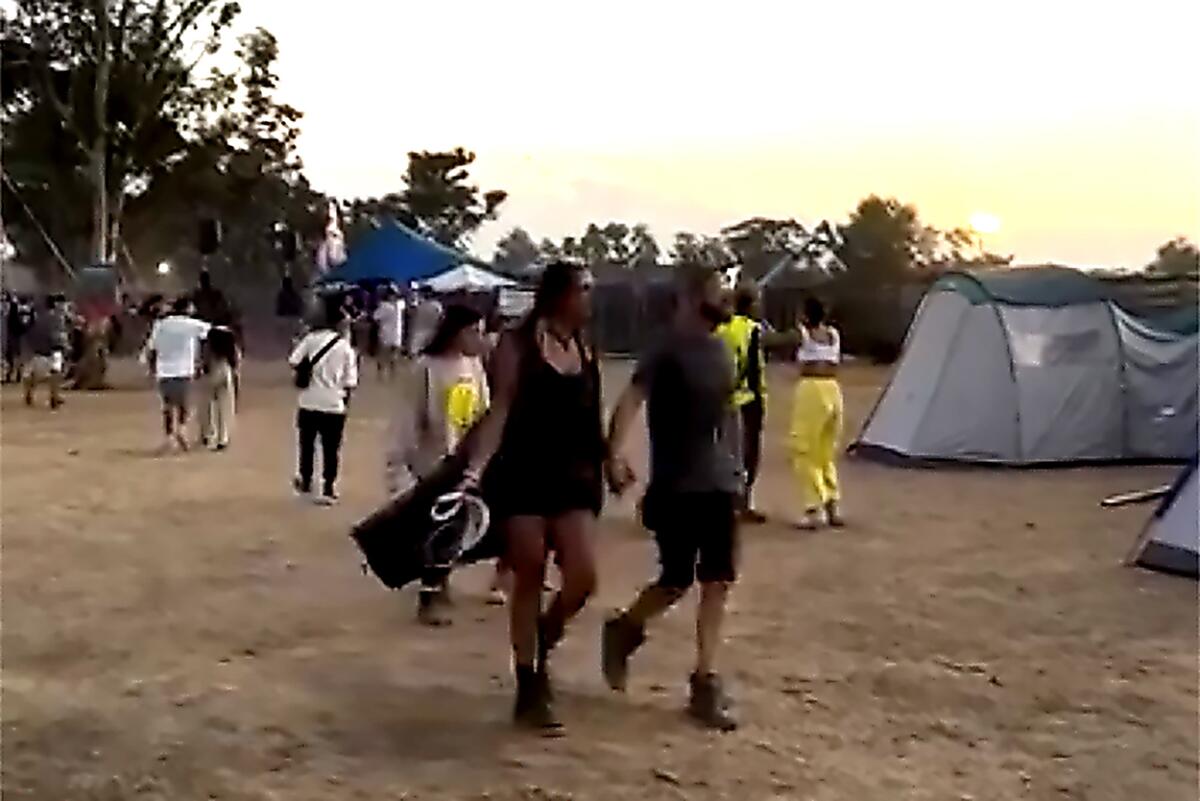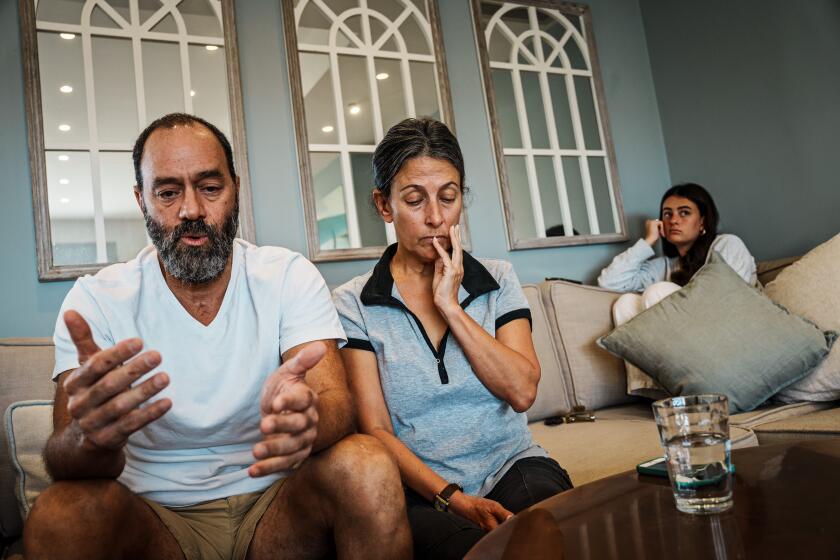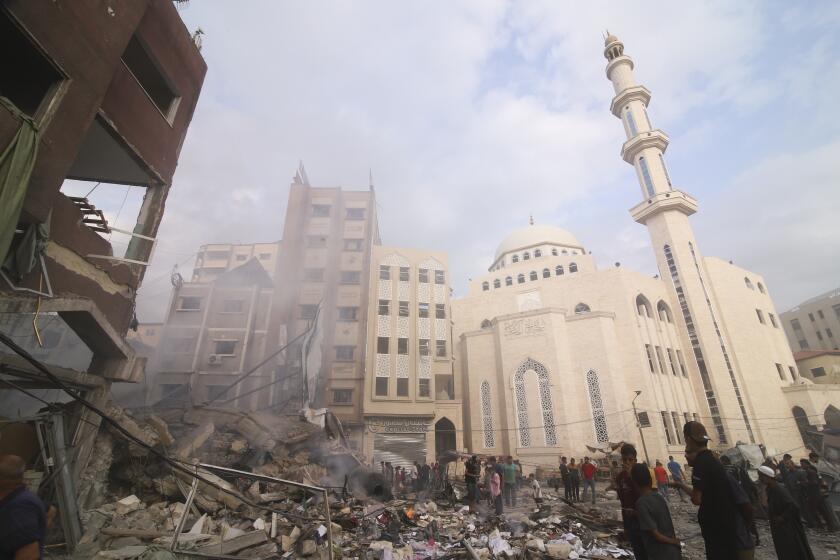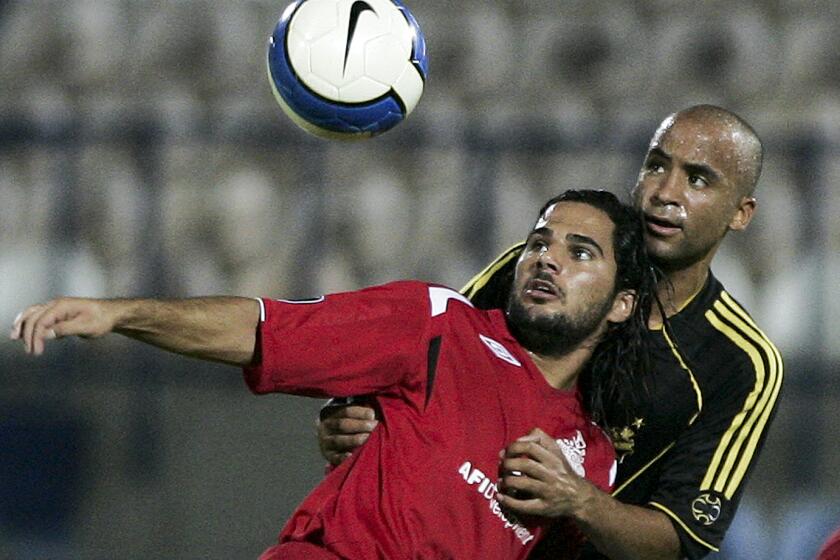L.A.’s close-knit Israeli dance-music community mourns deadly attack on Supernova rave

- Share via
Kobi Danan’s Hollywood nightclub Sound is a home base for Israeli dance music expats in Los Angeles. Danan, who is Israeli, has lived in L.A. for two decades but cherishes the close-knit circle of musicians, DJs and festival industry pros that pass through his venue.
Last weekend in Israel, Hamas fighters attacked the Supernova rave in the Negev desert, just a few miles away from the border with Gaza, as part of a broad offensive into Israel.
Danan, 42, was intimately familiar with that area’s festival scene, now turned into a site of unimaginable grief. At least 260 people were killed, with hundreds more injured or kidnapped and still unaccounted for out of a crowd estimated at several thousand.
“It’s affected me deeply,” Danan said. He said that a close Israeli friend who lives in L.A. was killed at the festival, and that the friend’s daughter was badly injured and her whereabouts are still unknown. “We canceled some of the shows we’re promoting with a lot of Israeli fans because it’s the right thing to do. It’s really hard for our music community to talk about what happened there.”
The tragedy at Supernova, an otherwise typical desert festival with Burning Man-style music and art installations, has deeply shaken those with connections to that country’s dance music scene. Israel has a globally prominent dance music industry, with dozens of festivals and nightclubs catering to locals and travelers. For those abroad who grew up in that world, many like Danan knew fans who were killed or kidnapped.
“We’re used to missiles being fired there, which is terrible too,” Danan said. “But this. It’s a horror story.”
California native Hersh Goldberg-Polin, 23, hasn’t been seen by family since before Hamas’ attack on Israel. They’re determined to find him and bring him home.
For the record:
8:47 a.m. Oct. 17, 2023An earlier version of this article implied that Israel has controlled the Gaza Strip. Israel has controlled its border with Gaza, but not the territory itself.
For decades, Israel has controlled its border with the Palestinian territory of Gaza on the Mediterranean, where many residents are impoverished and cannot leave. While Israel and Palestinians each live under threats of violence, the attack on the Supernova festival was something different and devastating.
Raz Gaster is an Israeli artist manager who booked a number of acts at Supernova, an offshoot of the Brazilian dance music festival Universo Paralello. He’s worked with L.A. EDM promoter Insomniac and festivals like Electric Daisy Carnival in Las Vegas. “Israel is one of the biggest countries for this music, you can party 24/7 and hear electronic music in weddings, gas stations, coffee shops,” he said.
Gaster was at the Supernova site when the attack began early in the morning on Saturday. He was close to the main stage and artist area when rockets began hitting nearby, and was able to gather some friends and colleagues into a car and drive south to an artist compound 30 kilometers from the festival site.
Then the calls poured in about the scale of the violence happening inside the festival grounds. He did his best to coordinate with local officials about where friends and colleagues were located, but he said he lost many friends and peers in the attack.
“It’s super hard,” Gaster said, in a phone interview from his home in northern Israel. ”It’s my friends, it’s my colleagues, it’s people I go out with every week. So many of our community are still missing.”

Those abroad who know the scene well have been frantic to get news of loved ones.
Ariel Vromen, an Israeli film director and electronic music DJ based in L.A., said he knew several friends who were attacked at Supernova including some whose children were killed. He grew up in Israel’s dance music scene attending similar events, and performed at a different dance music festival near the Supernova site in March.
“When you play these events, you’re on cloud nine, trying to connect with people,” he said. “It doesn’t matter what else you believe. Being murdered just because you were there, that level of brutality, it’s really alien for everyone.
“Dance music was a safe haven for kids in a very stressful, high-pressure life there,” he continued. “These were just unarmed ravers in the their 20s being chopped down.”
Prime Minister Benjamin Netanyahu and a leading opposition figure have created a wartime Cabinet to oversee Israel’s latest war against Hamas.
For Erez Sivan, a 30-year-old Israeli musician and DJ who moved to L.A. from Tel Aviv six years ago, the attack shook her extended family in Israel and the U.S. She said a cousin was kidnapped from a town just outside the festival site.
“I feel very helpless being here. Every single Israeli friend of mine knows someone who was there, someone who was murdered,” Sivan said. “It’s such a small country, and when you work in music you’re only two degrees of separation from all those people. The fact that it happened at a celebration, a sacred and peaceful place like that, it just makes you want to vomit. I feel for any civilian on both sides about to be hurt. No one deserved this.”
Music fans here and abroad have grown sadly familiar with mass violence at concerts, with attacks at the Route 91 Harvest Festival in Las Vegas, where a gunman killed 60 in 2017, and at local clubs like the Borderline Bar & Grill in Thousand Oaks, a country-music venue where a shooter killed 12 in 2018. The attack on Supernova recalled the 2015 assault on the Bataclan club in Paris, where Islamic State-aligned terrorists killed 130 as Palm Desert’s Eagles of Death Metal performed.
For those connected to the Israeli dance music scene, an event meant to be a joyful celebration is now associated with an unimaginable atrocity.
“Our community knows how to cope with grief,” Gaster said. “Our solution will be to listen to our music and dance and try to come out of it together.”
“I hope there will be peace one day soon,” Danan said. “No one can live like this.”
Ex-Israeli soccer player Lior Asulin was among the more than 260 people killed by Hamas militants at the Supernova music festival near the Gaza border.
More to Read
The biggest entertainment stories
Get our big stories about Hollywood, film, television, music, arts, culture and more right in your inbox as soon as they publish.
You may occasionally receive promotional content from the Los Angeles Times.














